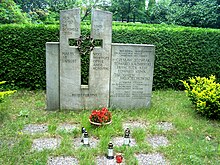Czesław Jóźwiak
Czesław Jóźwiak , also in German Ceslaus (born September 7, 1919 in Łążyn near Bydgoszcz ; † August 24, 1942 in Dresden ) was a Polish resistance fighter from the Salesians of Don Bosco . During the German occupation of Poland, along with other young Poles, he was sentenced to death by the Nazi judiciary and executed in 1942. He is venerated as a martyr in the Roman Catholic Church and was beatified by Pope John Paul II .
Life
From the age of ten, Czesław had been associated with the Salesians of Don Bosco in the Poznań Oratory , an ecclesiastical leisure-time care facility for boys. As a high school student, he led a small youth group in the oratorio. After the attack on Poland and the incorporation of the western Polish territories into the German Reich, he could not continue school and began to work. The oratory was closed and used by the German military . With his friends Edward Kaźmierski , Franciszek Kęsy , Edward Klinik and Jarogniew Wojciechowski , who knew each other from the oratorio, he was during the German occupation on 23/24. Arrested September 1940 and initially held in the infamous Fort VII in Poznan . After several other stations in prisons and prison camps, he was in May 1942 after Zwickau brought and on July 31, 1942 together with the other four boys from the Court of Appeal poses on the basis of Poland Criminal Law Regulation for alleged preparation for high treason sentenced to death. The judgment was carried out on August 24, 1942 in the Dresden execution site on Münchner Platz . The prison chaplain, Father Franz Bänsch OMI, accompanied the group of convicts, consisting of eight young Poles, with pastoral care to the scaffold . They are among the victims of the extremely harsh Germanization policy pursued by National Socialist Germany in the so-called Warthegau , which not infrequently also turned against church groups and intellectuals.
Commemoration
The place of execution in Dresden became a memorial to the anti-fascist resistance in the GDR . Because of their ecclesiastical background, the names of the five friends from the Poznan Oratory were not mentioned there. “The Five”, as they are called in Poland, were beatified on June 13, 1999 by the Polish Pope John Paul II, together with 103 other Polish martyrs of the German occupation regime. In the same year the grave was rediscovered in the New Catholic Cemetery in Dresden; a monument of the Catholic parish of St. Paulus in Dresden-Plauen reminds of Jóźwiak among other things. The day of remembrance is August 24th, and June 12th in the Salesians' own calendar. Also on June 12th, the six blessed martyrs from Münchner Platz in Dresden will be commemorated, among whom, in addition to the five boys, the Polish friar Grzegorz Frąckowiak SVD , who was executed eight months later at the same place , is counted. A Roman Catholic parish that was newly established in the Dresden-Meißen diocese on June 1, 2020 was named after these six Nazi victims .
literature
- Johannes Wielgoß SDS : Blessed Franciscek Kęsy and Blessed Edward Clinic. In: Helmut Moll (ed.): Witnesses for Christ. The German martyrology of the 20th century. Volume I. 7th, revised and updated edition, Schöningh, Paderborn et al. 2019, ISBN 978-3-506-78012-6 , pp. 221-224.
Web links
- Czesław Jóźwiak in the Ecumenical Lexicon of Saints
- Antonio Borrelli: Beato Czeslaw Jozwiak Martire. Short biography on santiebeati.it (Italian)
| personal data | |
|---|---|
| SURNAME | Jóźwiak, Czesław |
| ALTERNATIVE NAMES | Jozwiak, Ceslaus |
| BRIEF DESCRIPTION | Polish resistance fighter, Seliger |
| DATE OF BIRTH | September 7, 1919 |
| PLACE OF BIRTH | Łążyn near Bydgoszcz |
| DATE OF DEATH | August 24, 1942 |
| Place of death | Dresden |
